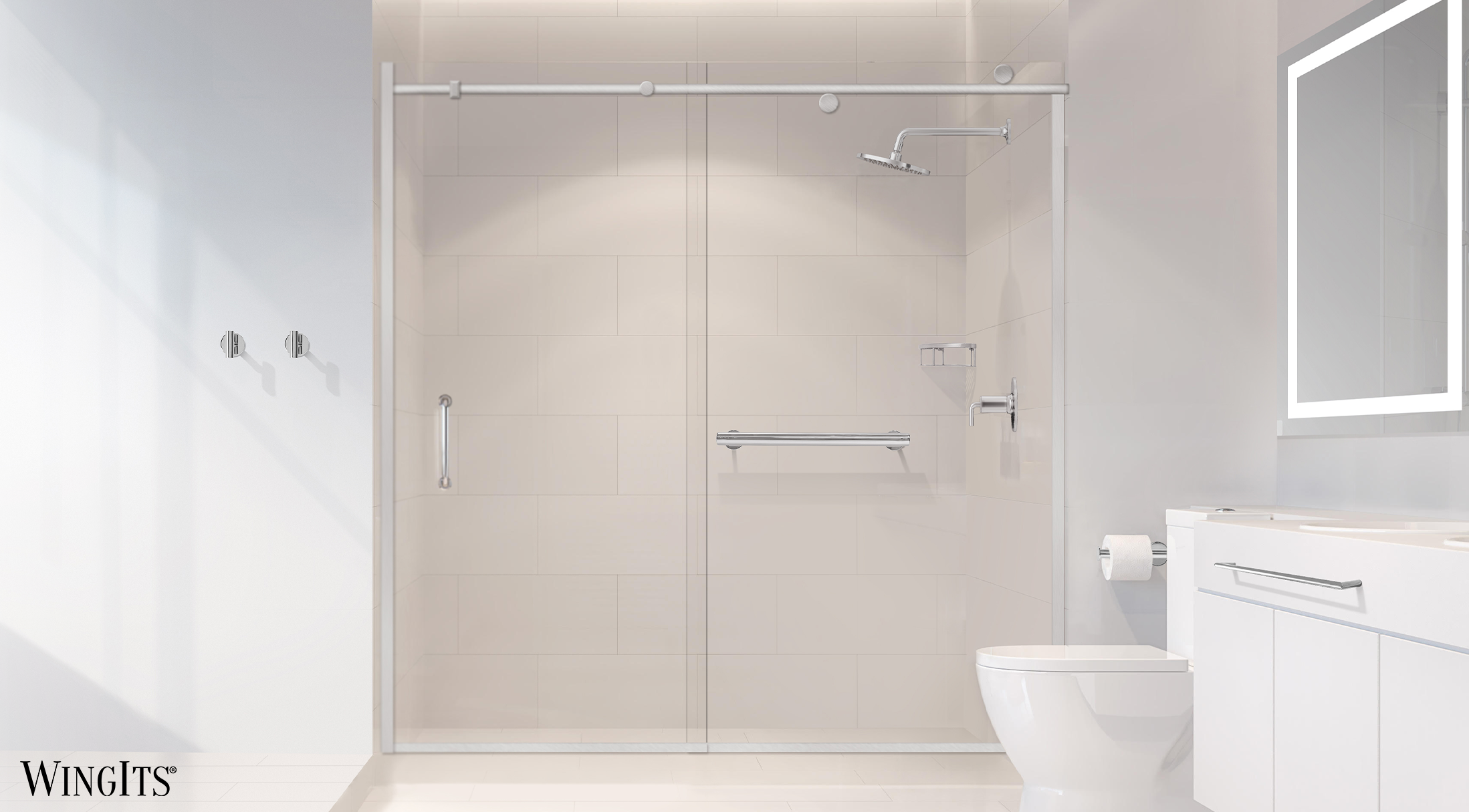
THE ENVIRONMENTAL HEALTH STORY OF
Recycled content |
Choose products crafted of materials incorporating post-consumer recycled content. When specifying metal hardware and accessories such as grab bars or robe hooks, consider stainless steel, which generally comprises salvaged raw material and is easily recyclable. Tempered glass is another good choice when specifying items like shelving. |
Low-impact finishes |
Although a finish can enhance material longevity, some topical coatings have a negative environmental impact. Opt for a finish that utilizes few or no chemicals of concern—for instance a durable PVD coating, which is applied via a process that emits minimal VOCs and also renders the metal recyclable at the end of its lifecycle. |
Ease of cleaning |
Sanitizing surfaces is especially important in the post-Covid area, particularly in the bathroom. Products that are able to be disinfected and maintained easily and without the need for harsh cleaning agents will encourage hygiene, ensure product durability, and help foster good indoor air quality. |
Longevity |
Seek out a 5- to 10-year warranty: Accessories and hardware engineered to endure in the bathroom—where humidity can corrode, tarnish, or otherwise compromise materials, finish, or functionality—helps keep product out of landfill and reduces carbon footprint. When spec’ing wall-hung accessories like grab bars and shower seats, look for items that feature secure mounting systems, which will preserve the integrity of both the product and the wall itself. |
Recycled packaging |
Manufacturers are increasingly utilizing recycled-content packaging that is also recyclable. The availability of carbon-neutral shipping options can help further reduce project carbon emissions. |
Chrome finish |
Supersleek easy-to-clean, corrosion-resistant surfaces are favored in the bath, but many come with a downside. Avoid both chrome plate and chrome finish, the production of which utilizes dangerous heavy metals. Opt instead for more environmentally conscious high-polished stainless steel, which looks and performs similarly, without an applied coating. |
Plastic components |
Plastic, including resin, is a popular choice for countertop items and other bathroom accessories given its water resistance—but is much harder to recycle and negatively impacts human health. Eco-friendly materials such as ceramic, glass, certain metals, and responsibly sourced stone are better alternatives. Find product information using our vendor database to assure your selections have been evaluated for health and environmental impact. |
Complicated Disassembly |
Products that can’t be easily broken down into constituent parts at the end of their lifecycle are often impossible to recycle. Review specification sheets to discern whether a product made from more than one material can be dismantled, and favor products from brands with end-of-life take-back programs. |
Lack of certifications |
In order to assure products have been vetted for environmental performance and footprint, seek products with third-party certifications and standards. The MindClick Sustainability Assessment Program (MSAP) provides this information and more at a glance. |

WiFi- and sensor-enabled “smart” plumbing is becoming more affordable and accessible—a trend that will have a positive environmental impact in the form of reduced water waste and more. Options offer voice activated faucets that control filling and temperature settings, along with behind the wall leak monitoring. All create a sense of well-being and security for the user.
Read More
Decrease the environmental impacts of public restrooms via a wellness-conducive, water-efficient design. Incorporate features like water-use monitoring and products with third-party certification. LEED has guidelines that help with product selection through credit requirements for indoor water. Consider investing in the expertise of a specialist in holistic water-use planning at the beginning of the projects design.
Read More
For building operators, high-efficiency toilets (HET) provide tax breaks and are cost saving, showing significant reduction in water utility bills. When choosing a water-saving HET for commercial applications, look for one that utilizes existing plumbing systems, minimizes maintenance, and is both EPA WaterSense-certified and has MaP Premium Certification for high-traffic commercial buildings.
Read More
Recap of a wellness-focused round-table discussion between six top hospitality designers, addressing the topic “Concept Versus Reality in Bathroom Specification.” The conversation touched on trade-offs between cost and performance, trendiness versus longevity, water pressure and water flow requirements, guest expectations and budget/space constraints—as well as desirable features such as a great shower experience, bidets, and sight-lines to a window. A recognition of supply chain traceability and commitments to social justice have gained importance in selecting brands.
Read More
Strength meets beauty in WingIts’ high-design, low-impact bath accessories

Ideas and inspiration for creating a high-style bathroom that is designed with sustainability in mind. Energy and water-saving products are addressed, along with product durability, material recycling, recycled packaging, chemical composition of materials, and reducing water volume. Ideas are offered for cabinetry, flooring, fixtures, and tech-activated systems.
read more
A look at how federal and state standards for low-flow faucets are inspiring manufacturers to introduce ever-more water-efficient models to the market—thus making them more ubiquitous and accessible.
read more
An international design competition sponsored by Roca focuses on sustainably minded global bathroom design. Entrees showed a change in perspective from previous years focusing on how design thinking can help to meet new challenges of sustainability, in social, economic, and environmental aspects.
read more